#edit | priam
Text

I have endured what no one on earth has ever done before
I put my lips to the hands of the man who killed my son
#deltarune#gaster#deltarune player#i love still headcanoning gaster as sans and papyrus's dad despite knowing that he saw everything that happened in undertale (including#the no mercy route) and seeing how friendly he is with us in deltarune#you would think he'd hate us and want do nothing to do with us or to hurt us but. he wants to create a new future with us.#he thinks that our search for him is a wonderful thing. he thinks we created a wonderful form. hes thankful for our time.#knowing this while still believing he's the father of characters we've killed makes him such an interesting character#we know he's tied to undertale so regardless of if he's actually their dad or not we have hurt people he knows#and he still treats us with so much care#i love this guy. i wanna know him already#this was fully inspired by a gorgeous drawing by WolfyTheWitch on twitter#of. actual priam jskdjdk#this was drawn using my poor poor pilot pens during classes over three days. i need to buy new ones now lol#i need to use this technique more often#its super time consuming but it looks so cool. and the paper has such an interesting texture now :]]]#i also LOVE drawing gasters hands all melting and barely even like hands#and brown paper packages tied up with string#my art#*i edited this a bit in digital i forgot to mention that gdjdjfk
483 notes
·
View notes
Text
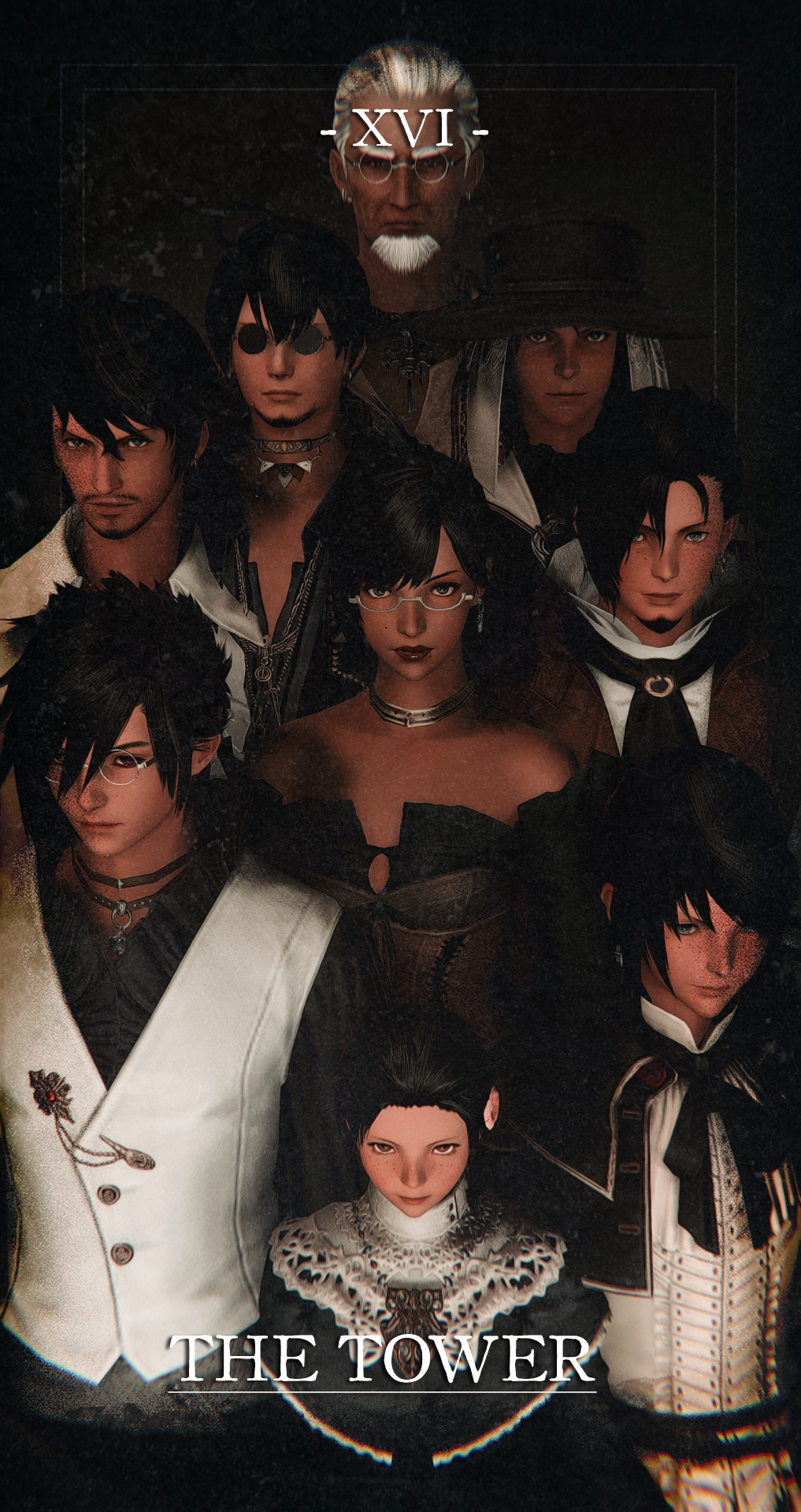

the major arcana, shuffled: 5/??
THE TOWER;
⤉ disaster, destruction, upheaval, trauma
⤈ resisting change, avoiding tragedy, delaying the inevitable, avoiding loss
#ffxiv:tma#back at it again with the cursed family paintings!!#i was stumped on how to make this look like a tower ngl. i think i did good but i feel like these needed more post-process editing. w/e#if you see clipping no you don't ssshhhhhh-#yea i know cassie's husband isn't here but this isn't about him. this is about the tatlonghari's collective family trauma!!!#only ones missing are paris and andi. paris doesn't consider themselves fully apart of the family and andi missed a lot of the upheaval#wanted to showcase the entirety of the family and how priam has been the direct cause of all their problems#the symbolism here is that the left showcases the ones who are alive. the right are those who were killed by priam#notice how on the left they're not touching each other despite being so close to one another#they're not smiling either. they're extremely distant even within close proximity#whereas the right they're holding onto each other and smiling (rather creepily but you know)#i made a corrupted version but i think it's important to see their happy faces more clearly. notice how they kinda look demonic#and yea priam's face is scribbled out but you can see that his face was beat in#and pammon (priam's twin) and andromache (who priam thought was dead for years) are choking him#the reverse got flipped wrong when you look at it rightside up but it adds to the creepiness i think#body horror cw#gore cw#<- just in case#mygposes.#ffxivsnaps#gposers#ffxiv gpose#ffxiv oc#hyur
56 notes
·
View notes
Text




Golden Hands and Golden Fingers
Priam, the shepherd
Priam has lived in Hwenich all his life, and since losing his family as a child, has wanted to leave it. Working as a goatherd with his trusty wolf-dog at his side, Priam watches the village elders leave every year for the knights’ tourneys and extravagant celebrations of the Sun Maidens’ court. He longs to chase dreams of knighthood, courage, and exploration. When Priam is asked to accompany the elders as a last-minute replacement, it seems his opportunity for adventure has finally arrived.
More about Golden Hands and Golden Fingers here!
Leave a comment or an ask to be added to the taglist.
#writeblr#writers of tumblr#my wips#my ocs#my edits#my moodboards#poc characters#lgbt characters#original fiction#original characters#fantasy fiction#high fantasy#wip: ghgf#oc: priam
19 notes
·
View notes
Text

1 John 4:16 by The Mountain Goats // Priam Asking Achilles for the Body of Hector by Théobald Chartran
#lyrics edit#art#lyrics#tmg#collage art#the mountain goats#1 john 4:16#iliad#the iliad#priam#hector#achilles
91 notes
·
View notes
Text


ST Epic Cycle AU - The Sacking of Troy
#st epic cycle au#faith edits#i cut a LOT out of these edits#between helen going around and calling out the greeks by name#the sacrifice of polyxneia#little ajax's entire actions#and the deaths of priam and Astyanax#just#the sacking really was a bad time#i frankly don't blame the gods for getting pissed#anyway#we start the returns next!#i've got those already done and i'm probably halfway through my odyssey edits now#and the odyssey series is probably gonna be just as long as the trojan war series#but you really should have expected that#i am editing it in the way the odyssey was actually written#:D#nancy wheeler#robin buckley#dustin henderson#heather holloway#carol perkins
2 notes
·
View notes
Text






Some quick self-indulgent FEH edits I did of Robin being shipped with some of my fav guys in Awakening (I’m still waiting for Vaike to be here)
17 notes
·
View notes
Photo

(Mod Toto) Today is Priam’s birthday! And I still can’t believe that the fellow Ragnell enjoyer is in Heroes, but I’m happy to have him!
Everyone say Happy Birthday Priam!
38 notes
·
View notes
Photo


February kinda crept up on me and I’ve been focusing a lot on my mental health the last year and a half. As a result, I wasn’t able to write something for Priam this year (which I’m a bit sad about, though I’ll still try and get something made) for his birthday.
So I fell back on making him (and Robin) a paired theme image. I wish I could remember where I found it, as I offhandedly remember it may have been from a writing theme blog that’s since been (potentially?) lost to the void that tumblr’s since become.
#Fire Emblem#Fire Emblem Awakening#Priam#Robin (Fire Emblem)#Ylisse#Long Post#Oracleether Edit#Radiant Hero Priam#High Deliverer Robin#OTP: A Token of my Great respect
7 notes
·
View notes
Text
To explain my chicken obsession:
* * *
Me: I’m enjoying drawing chickens for this commission.
Husband: ha ha Greek Myth Chickens!
Me: 🤔
I now present to you,
🏺Greek Myth Chickens 🐓
ILIAD EDITION
(drawn and originally posted in May 2021, coloured and reposted Jan 2023)
1) Egg-chilles and Patro-cluck (Achilles and Patroclus)
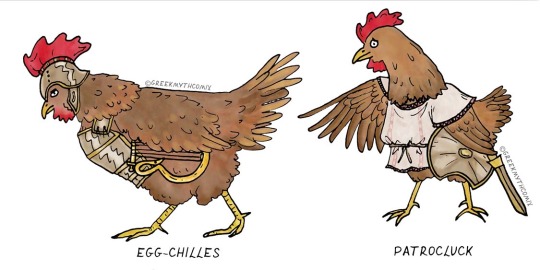
2) Mene-lay-us and Al-eggs-andros (Paris) (Menelaus and Alexandros [Paris])
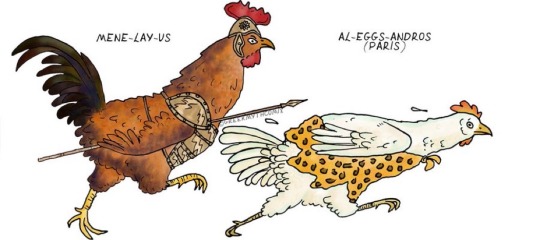
3) Egg-amemnon (Agamemnon)

4) Aph-roost-ite and Helen of Spur-ta (Aphrodite and Helen of Sparta)
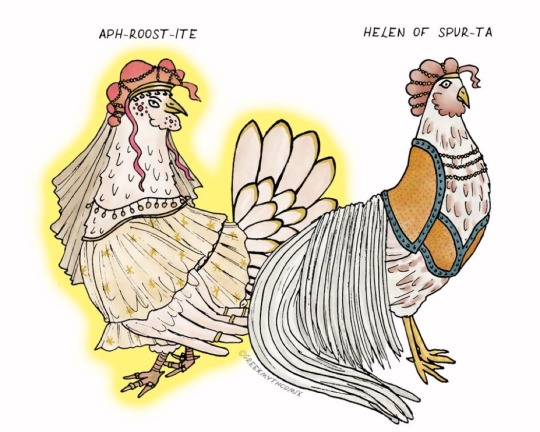
5) Nest-or (Nestor)
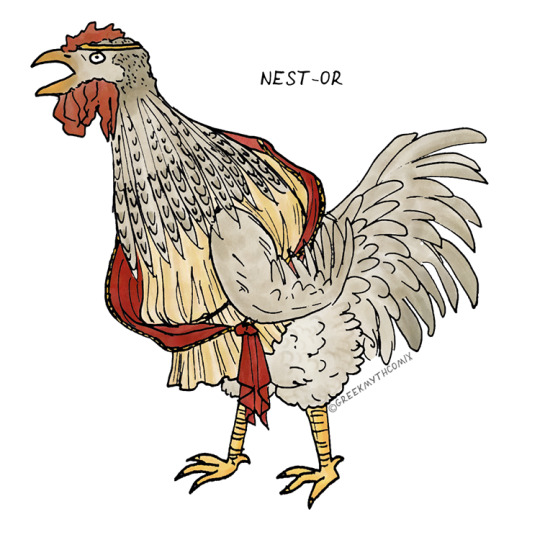
6) Androma-beak, Peck-tor, and Astyan-egg (Andromache, Hektor and Astyanax)
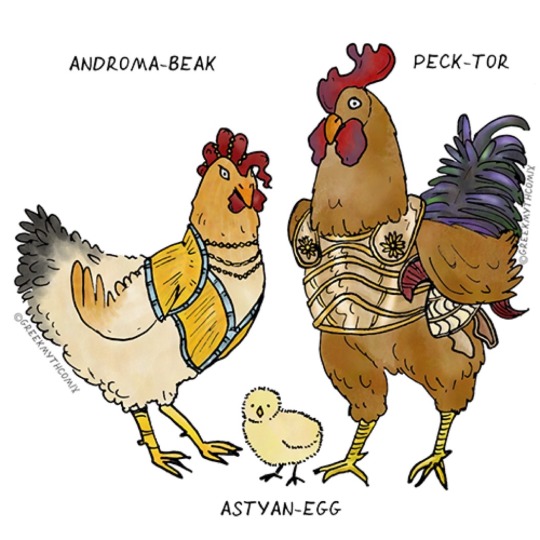
7) At-hen-a and Egg-dysseus (Athena and Odysseus)
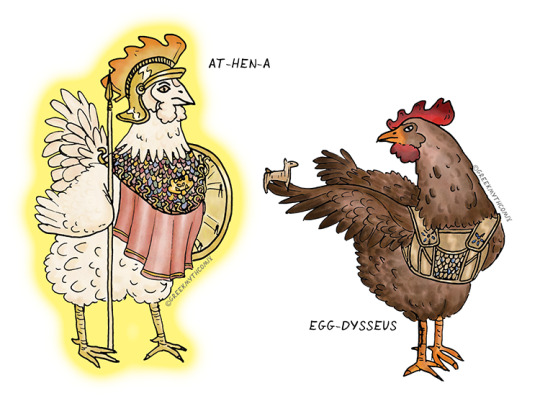
8) Preen-am and Peck-uba (Priam and Hekuba [Hekabe])
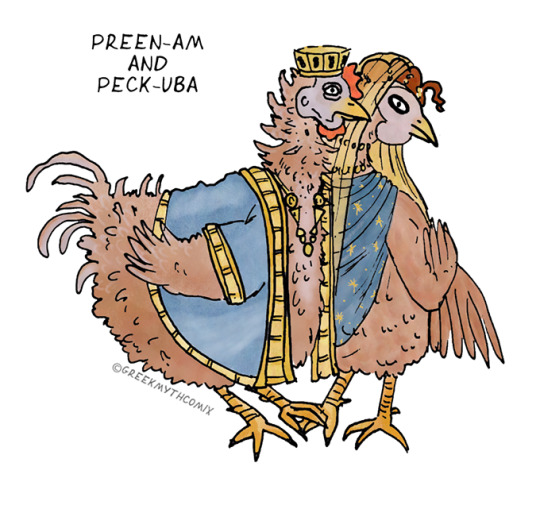
9) Brood-seis (Briseis)
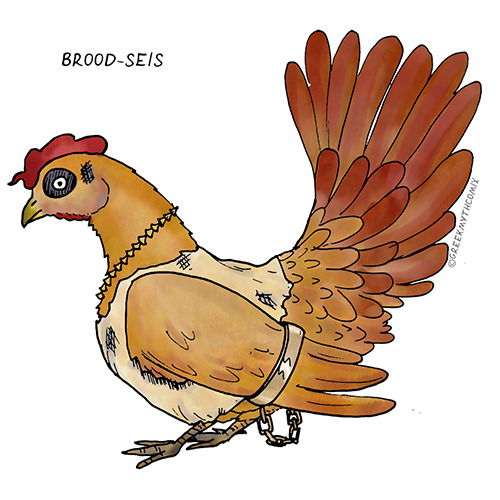
10) Diom-egg-es (Diomedes)
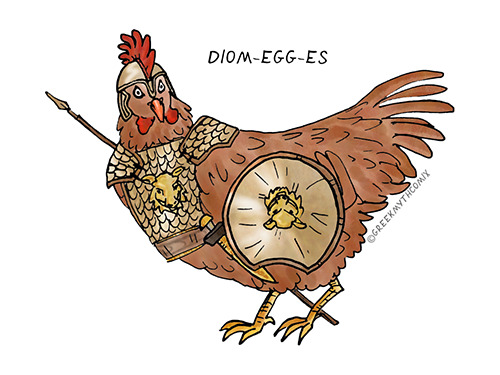
EDIT: Greek Myth and Roman History chicken MASTERPOST - https://www.tumblr.com/greekmythcomix/725538723329179648/greek-myth-roman-history-chickens-master-post Here Be More Chickens Cosplaying
(See next post for last 3 Iliad chickens- https://www.tumblr.com/greekmythcomix/722218945873051648/iliad-chickens-continued-11-lay-jax-tel-capon )
#Achilles#Patroclus#patroklos#akhilles#greek mythology#greek myth retellings#greek myth#comix#greek myth memes#Iliad#Homer#artwork#my artwork#Greek myth chickens#illustration#pun#fanart#chickens#tagamemnon#the Iliad#classics#classical civilisation
11K notes
·
View notes
Text
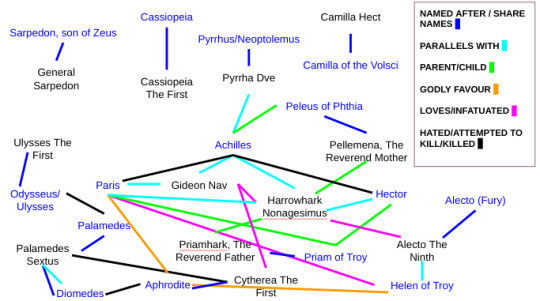
LOCKED TOMB CHARACTERS X CLASSICAL REFERENCES
explanations for parallels come from here and here
I know I spelt pelleamena wrong and missed off juno zeta btw but it was getting a bit crowded. I could also probably extrapolate more but it can stay like this for now
EDIT: BITS WOT I FORGOT AND ADDITIONS FROM TAGS:
@mayasaura makes a fantastic point about the treatment of gideon's body by BOE being almost identical to the treatment of hector's by achilles, down to animals refusing to touch it and it not rotting or tearing because of divine intervention. hence there should be a light blue line between gideon and hector. this hadn't ocurred to me is and is v cool, here is their post on it (the original asker's point about harrow and priam is also v good)
@iamanoccasionaldoodler points out that Pyrrha is named after Achilles directly, given the 'Achilles taking the name of Pyrrha while on Skyros avoiding the war' thing; I did just forget to draw the line here sorry lol it was in my post! also the tags about camilla and hector... no you're right. they feel so similar, there has to be something.
@zombified-queer mentions I left out dios apate; bugger it, so I did lmao. I was focusing mostly on characters but that's such a big one! in the iliad it's the deception of zeus, hera's plan to distract him by seducing him so that the greeks can regain the upper hand. in harrow the ninth, as we know, it's... not dissimilar! both times in fact it is very similar!
I did also forget Juno Zeta I know, but as it currently stands I don't really know if it has any narrative significance...? Maybe.
I also realised I forgot Protesilaus, god damn it
#the locked tomb#tlt#gideon the ninth#harrowhark nonagesimus#gideon nav#priamhark noniusvianus#pelleamena novenarius#alecto the ninth#palamedes sextus#camilla hect#pyrrha dve#parallels#my post#ik this is crazy but I made it for a friend fhdjd
792 notes
·
View notes
Text
felt like translating a little bit of the preamble to the edition of the odyssey I own (very good translation with super insightful annotations btw):
Through all these tales we see the traits that make up the personality of the protagonist of the Odyssey. Odysseus is, at the same time, a liar and a generous man, he's cautious and brave, a smooth operator and a loyal husband. This is what's extraordinary about this stupendous character: he's not one-note, like Achilles, who only yields and is humanized at the death of Patroclus, hellbent on revenge, or at the tears of a supplicant Priam, this time moved by compassion by the suffering old man and afflicted by the thought of his own aging father Peleus. In contrast, Odysseus has a much richer personality. Throughout the poem he never stops thinking about returning home, he, however still takes on risky adventures, and while he is intelligent enough to trick the cyclops, it was him who couldn't resist the temptation of entering the one-eyed monster's cave.
One minute he's incredibly prudent (like when he covers his crewmates' ears with wax to resist the deadly fascination of the sirens' song while he gets tied up to the mast of the ship, following Circe's wise advice to a letter), and the next he's recklessly daring (like when he gets armed, grabs two spears and gets ready for the grueling and disproportionate feat of fighting rocky Scylla). Such is homeric Odysseus, a hero with a complex personality who acts in an equally complex epic poem wherein diverse legends have converged. While the Iliad tells of a mere episode of the Trojan War, which serves both as a setting and a cause of Achilles' rage and allows for war feats and human feelings and passions to be described, the Odyssey is the epic poem about a character who integrates not only the adventures he experiences, but also the actions of other characters into a narrative whole. Around the figure of Odysseus polytropos and polytlas, gather gods, beggars, suitors, loyal and disloyal servants, nymphs, witches, giants, cannibals, hospitable men, the souls of the dead, the caring nursemaid, the loyal dog and his dearest loved ones: his parents, his son, his loving wife.
Antonio López Eire
45 notes
·
View notes
Text
Paris and Vanity
[This is an extensive text of my opinion about the character of Paris. These are just opinions, not some super deep analysis! ALSO: I think it's interesting to mention that I use English editions because the post is in English, but I didn't read these editions in full, just the excerpts I wanted. I read editions in another language. So I'm not saying that I recommend any of these editions!!]
I find it interesting how the characteristic of Paris being vain makes perfect sense with his myths, regardless of the version (in this case, the Greek myths. I haven't read his Roman ones yet). Characters in Greek mythology tend to change their essence a lot depending on the version (I think one of the most obvious example is Menelaus), but Paris in his constant vanity always made sense to me.
The best-known version of the birth myth of Paris is the one in which Hecuba dreams that she will give birth to the one who will destroy Troy and, because of this, Paris is left to die on Mount Ida. But he is saved by Agelaus and grows up as a shepherd, unaware that he has Trojan royal blood.
Growing up as a shepherd, Paris did not have the status or wealth of royal lineage as his sibilings did. He was strong, but it's not like he had such grandiose adventures that would be enough to give him glory and fame. But there was something he undeniably had: beauty. Among Priam's children, Paris stands out for being very beautiful and, even when he thought he was a plebeian, this was already notable in him. At a time when he didn't have the power, the fame or the wealth, Paris had the beauty. I'm not surprised he became attached to his vanity. That was something of his, and it never stopped being his even when he wasn't a prince.
[3.12.5][...]The first son born to her was Hector; and when a second babe was about to be born Hecuba dreamed she had brought forth a firebrand, and that the fire spread over the whole city and burned it.227 When Priam learned of the dream from Hecuba, he sent for his son Aesacus, for he was an interpreter of dreams, having been taught by his mother's father Merops. He declared that the child was begotten to be the ruin of his country and advised that the babe should be exposed. When the babe was born Priam gave it to a servant to take and expose on Ida; now the servant was named Agelaus. Exposed by him, the infant was nursed for five days by a bear; and, when he found it safe, he took it up, carried it away, brought it up as his own son on his farm, and named him Paris. When he grew to be a young man, Paris excelled many in beauty and strength, and was afterwards surnamed Alexander, because he repelled robbers and defended the flocks.228 And not long afterwards he discovered his parents.
(The Library. Translation by James George Frazer)
Then once he was called to be a jury in the dispute between Athena, Hera and Aphrodite to decide which of the goddesses was the most beautiful. Each of them, in an attempt to gain his favor, offered him a different reward if she was chosen. He chooses Aphrodite and, as a reward, Paris has the most beautiful woman in the world: Helen of Sparta, already married to Menelaus.
[E.3.2] For one of these reasons Strife threw an apple as a prize of beauty to be contended for by Hera, Athena, and Aphrodite; and Zeus commanded Hermes to lead them to Alexander on Ida in order to be judged by him. And they promised to give Alexander gifts. Hera said that if she were preferred to all women, she would give him the kingdom over all men; and Athena promised victory in war, and Aphrodite the hand of Helen. And he decided in favour of Aphrodite51; and sailed away to Sparta with ships built by Phereclus.52
(The Library. Translation by James George Frazer)
I often joke about how Paris's choice is really dumb to me because I would never choose the most beautiful woman over Athena and Hera's other much more interesting gifts, but I actually think it makes sense. A woman so beautiful that she's desired by everyone, that she is known for it, that she elevates her husband's status just by being with her? I think Paris chose Helen over the other options because she had a different status, much more than choosing her because he was out of simple lust. There are different wealth and achievements out there, but he couldn't specifically have the most beautiful woman in the world if he didn't choose her now as she was already married. And since he's already so aware of his beauty, I wouldn't be shocked if Paris felt entitled to the most beautiful woman because he's so handsome. And then discovering that she has the divine blood of Zeus? Helen represented even higher status.
Even in The Odyssey, Proteus makes it seem like the main reason Menelaus is destined to go to Elysium is that he's Helen's husband and consequently this makes him Zeus's son-in-law. Of all the things he could say to Menelaus, the one he chooses to use to assure him that he will have Elysium is his marriage. Helen, as a wife, actually elevated Menelaus' status in a way beyond just marrying her putting him into the lineage of Sparta (which was already a big deal). She elevated him to the point of guaranteeing a good afterlife for him, at least in the Homeric tradition — this, of course, is not a fixed tradition in the myths because almost nothing is; Helen is not always married to Menelaus in Elysium, Pausanias even offers a version in which she is married to Achilles.
So I spoke, and he in turn spoke up and made answer:
“That was Odysseus son of Laertes, who makes his home in
Ithaka, whom I saw on an island, weeping big tears
in the palace of the nymph Kalypso, and she detains him
by constraint, and he cannot make his way to his country,
for he has not any ships by him, nor any companions
who can convey him back across the sea's wide ridges.
But for you, Menelaos, O fostered of Zeus, it is not the gods' will that you
shall die and go to your end in horse-pasturing Argos, but the immortals
will convoy you to the Elysian Field, and the limits of the earth, where fair-haired Rhadamanthys
is, and where there is made the easiest life for mortals,
for there is no snow, nor much winter there, nor is there ever rain,
but always the stream of the Ocean sends up breezes
of the West Wind blowing briskly for the refreshment of mortals.
This, because Helen is yours and you are son-in-law therefore
to Zeus.”
(The Odyssey. IV, 554-571. Translation by Richmond Lattimore)
In The Iliad, unlike what usually happens, Paris has his consort status tied to Helen instead of her having her consort status tied to him. He who is "fair-hatred Helen's consort". It's she who gives status to Paris, and not the other way around.
Hesiod, for example, generally puts the active role in the masculine character. It's the husband who takes a wife, it's the man who takes a woman in his bed. But he doesn't seem to do this with Helen. In the fragments we have from the "Catalogue of Women", where Hesiod describes a lot of female characters from Greek mythology, it's the male suitors who want to be something for Helen. It's Helen who has the choice of choosing who she will take — when, in the myth of the Oath of Tyndareus, Helen chooses Menelaus, he is the one being given the honor of being her husband.
FRAGMENT 6838 - SUITORS OF HELEN (translation by Evelyn-White, H G.)
Berlin Papyri, No. 9739:
(ll. 31-33) to horse-taming Castor and prize-winning Polydeuces, desiring to be the husband of rich-haired Helen, though he had never seen her beauty, but because he heard the report of others.
(ll. 34-42) And from Phylace two men of exceeding worth sought her to wife, Podarces son of Iphiclus, Phylacus' son, and Actor's noble son, overbearing Protesilaus. Both of them kept sending messages to Lacedaemon, to the house of wise Tyndareus, Oebalus' son, and they offered many bridal-gifts, for great was the girl's renown, brazen . . . golden ((lacuna)) . . . (desiring) to be the husband of rich-haired Helen.
Berlin Papyri, No. 10560:
(ll. 52-54) . . . sought her to wife. And after golden-haired Menelaus he offered the greatest gifts of all the suitors, and very much he desired in his heart to be the husband of Argive Helen with the rich hair.
(ll. 63-66) But from Euboea Elephenor, leader of men, the son of Chalcodon, prince of the bold Abantes, sought her to wife. And he offered very many gifts, and greatly he desired in his heart to be the husband of rich-haired Helen.
Having talked about how Helen for me was more a choice of status than of desire, let's return to another aspect of Paris's vanity. Agamemnon contemptuously mentions how pompous Paris was on his visit to Sparta.
"[...]Then there came to Lacedaemon from the Phrygians
the man who, Argive legend says, judged the goddesses' dispute;
in robes of gorgeous hue, ablaze with gold, in true barbaric pomp;
and he, finding Menelaus gone from home, carried Helen off, in mutual desire, to his steading on Ida.[...]"
Iphigenia in Aulis. Translation by E. P. Coleridge.
Considering that this happens in Iphigenia in Aulis, the same play in which Iphigenia even says "and it is right, mother, that Hellenes should rule barbarians, but not barbarians Hellenes, those being slaves, while these are free", this could just be a stereotypical and xenophobic portrayal of the Trojans. Or Agamemnon could be exaggerating, after all he has more than enough reasons to want to throttle Paris. But, in this specific case, I think that's really how it is. Having spent years as a shepherd and then suddenly returning to being a prince, Paris would certainly show off his wealth much more than the other Trojan princes and princesses. This is because others were used to wealth and status, they had it since birth. Paris, however? This was all very new to him, and he was going to overdo it to the fullest.
As to how Helen was taken, sources seem to disagree. Homer seems to be going the way she was kidnapped and didn't want to go, judging by Helen's behavior towards the war, Paris and Aphrodite. Some versions place the Helen who was in Troy as not even being the real Helen (such as the play Helen, by Euripides). Some versions seem to reaffirm that she went because she wanted to, like Iphigenia in Aulis. Others are too ambiguous to know who to trust, as is the case with The Trojan Women. Etc etc.
Here I will be taking an excerpt from The Trojan Women. Helen tries to defend herself to Hecuba and Menelaus because Menelaus is convinced to punish Helen, while Hecuba is convinced to try to get her punished, as she sees her as one of the reasons for her misfortune. With each explanation that Helen gives for being innocent, Hecuba finds a way to counter it in a way that would be convincing enough for Menelaus to take seriously.
Faced with Helen's argument that she was taken by force with the help of Aphrodite, who gave her as a prize to Paris, Hecuba says:
"[…]You won’t persuade people with sense. You say Cypris
—that’s a laugh—came to Menelaus’ house with my son.
As if she could not have stayed peacefully in heaven
and brought you and Paris, Sparta, Amyclai and all, to Troy?
My son was preternaturally handsome and your mind,
on catching a glimpse of him, was turned into Cypris.
All that mortals lust for becomes Aphrodite to them.
Even the goddess’ name has come to suggest immodest desire.
When you saw him in his exotic foreign attire
shining with gold, you went mad with lust.
You had little luxury in Argos where you lived, but
once rid of Sparta you hoped to overwhelm
the city of the Phrygians flowing with gold
with your sense of style. The palace of Menelaus
was too puny for your extravagance to run rampant […]"
(The Trojan Women. Translation by Cecelia Luschnig)
Paris' expensive clothes are mentioned again, this time by Hecuba (considering that Agamemnon's previous speech is from a play by Euripides and that this play is also by Euripides, this similarity makes sense). And also, once again his beauty is reinforced. Right after Hecuba gives reasons why Hera and Athena's beauty dispute is an absurd idea (the reasons: Hera is married to Zeus, Athena is a virgin goddess), she gives explanations why it doesn't make sense for Aphrodite to help kidnap Helen. One of the reasons is that Aphrodite could simply make her appear in Troy, the other is that Paris was immensely beautiful, well dressed and something new in Helen's boring life and that's why he was seductive.
I got the impression that, although Euripides leaves it open-ended as to what happened, he was trying very hard to frame Helen as being guilty as well. However, regardless of whether she was kidnapped as she says or not as Menelaus and Hecuba think, the point is that Paris here is once again characterized as a portrait of opulence and beauty. More than that, here his characteristic as "exotic interest that seduces a married woman out of her life" is made even more evident than in Iphigenia in Aulis. Paris being the typical character archetype of a person from a foreign land, with immense beauty, seductive personality and exotic air is something common for his character. It's not like only Euripides imagined him like that.
In The Iliad, other characters constantly highlight Paris' vanity as a flaw. Hector mainly, but not only. For example, Diomedes uses this as immediate offense after being hit by an arrow from Paris. And throughout the Iliad, we see how Paris has a chance to give up Helen and end the war, but doesn't. He was too proud to give up what Helen meant in the first diplomatic contact between Achaeans and Trojans years ago, and after ten years he is even more immutable in his opinion.
It's been ten years, why give up now? Menelaus surpasses Paris in status, being a king while he is a prince, and in power, being stronger than him and having almost defeated him if not for Aphrodite's intervention. Menelaus may not be the favorite of a specific god, as is the case with Hector with Apollo or Odysseus with Athena, but he also receives divine help. The only "thing" Paris now has that Menelaus doesn't is Helen, and he won't give it up.
So Paris's vanity being something consistent is something that makes so much sense! Paris grew up as a plebeian with the distinguishing characteristic of being very handsome will be very aware of this. Consequently, he sees in beauty something that he has more than other people. Being so different, he is entitled to have more. When the goddesses offer him 3 reward options, the status Helen offers is seductive to him. Beginning to rise in status with Aphrodite's favor and his return to Trojan royalty, Paris is fascinated by wealth and status, so he acts like a peacock. As a prince, he is still concerned about always maintaining his beauty, as this is the only characteristic that has been with him his entire life and the one he trusted most. When Troy is threatened by his actions, Paris refuses to give in because he is too proud to give up what Helen means.
#Paris of Troy#birdie.txt#Helen of Sparta#Helen of Troy#birdiethings#I don't think I've ever commented about Paris here so I wrote this#I honestly would rather be talking to someone about this than writing texts on my Tumblr#But I've had the great fortune that absolutely none of my friends are interested in mythology lol#I was going to write this in Portuguese but I decided to use it as practice for reading in English#just the excerpts I wanted. I read it completely in another language.
42 notes
·
View notes
Text
Fun facts: many people who make genetically corrected premades complain that "isn't possible for two parents with hair of this color to have children with hair of this other color that aren't their" but... when I started writing down ALL the genetic data of ALL the premade sims, including the ancestors, on a notepad, I noticed one thing.
Maxis wasn't stupid or not caring. It's true that facial features are NOT genetically correct, but DNA...ladies and gentlemen...it is.
There's a reason why a blond son is born from a brown-haired mother and a black-haired father. And it's called recessive genetics. These sims inherit genetics from their ancestors, not their parents and that is something that EXISTS and is possible in the game.
Here's a example:
Contessa Capp have blonde hair, her parents are Scribonia Capp (brown hair) and Octavious Capp (née Caesar) (blonde hair). Contessa have his father hair.
Consort Capp (née Thebe) have blonde hair but his mother, Andromache Thebe and his father Hector Thebe (née Albion) have both brown hair. So...how it's possible that Consort has blond hair? This is very simple. He inherited them from his paternal grandparents, Priam and Hecuba Albion, both blonde. (Or from someone else from his family tree that have blonde hair)
Contessa and Consort, both blonde, together have 3 daughters and a son: Goneril, Regan, Kent and Cordelia.
Regan, Kent and Cordelia are blondes like their parents but Goneril have brown hair. Why? Let's go back in the family tree: who have brown hair in her family? Exactly, her maternal grandmather: Scribonia Capp. That's recessive genetics.
What means? Sims have two types of genetics: dominant genetics and recessive genetics. The dominant genetics are the ones they show (for example, in Contessa's case it's blond hair) the recessive one... is the one inherited from a parent or ancestor. In this case, Contessa inherited her mother's brown hair as recessive genes and made her daughter Goneril inherit it.
Recessive genetics can skip entire generations, even 3 and suddenly show up on a sim after all those generations.
In a completely curious way, even if Goneril was used as an example by Maxis herself as a sim that was born with recessive genetic...that's not her true genetics. If you look in simPe, it turns out that her dominant hair is... red. Not brown. What does it mean? This means that Goneril isn't actually brown...but she does have red hair and can have children with red hair. But now you'll say... From who the hell did she get her red hair from? Oh...it's very simple. She inherited them from her paternal great-grandmother Queen Thebe, she has red hair. Curious huh?
For more information, watch this video! It helped me a lot to understand!
youtube
EDIT: I add the fact that in the beta game Tybalt was supposed to be Goneril's son and if he kept his red hair it would make perfect sense because Goneril actually has red hair. BUT he could also inherit them from Queen Thebe too. Like I said, recessive genetics skip a lot of generations sometimes.
9 notes
·
View notes
Text


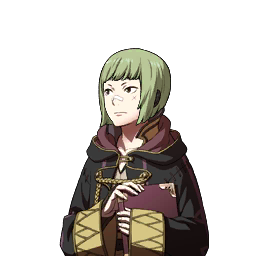



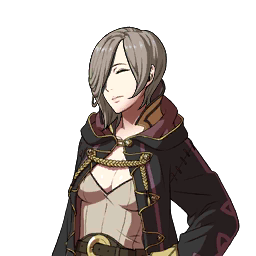
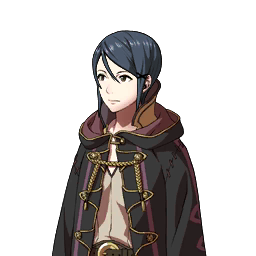



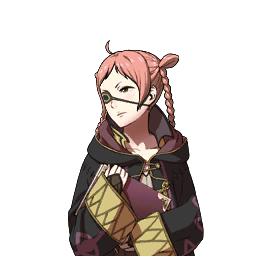
Since the interface for image posting is better than a decade ago and I can use the Robin Customizer website to make images better than what I can take with the camera (even if I have a phone now), I figured it's a good time to just create a new masterpost for all Avatars. Links back will be updated if ever I get the itch for a new run.
Names other than direct references come from Fantasy Name Generators and the Dragon Name Generator. You can also click on an image to see their name in the description.
More info under cut...copy 'n pasted from OG posts and edited due to context changes.
The first is Teefa, named after my Head Muse. She’s married to Lon’qu because I have a big obsession with Swordsmasters.
The girl with blue hair is Lufia, named for the heroine of the first game in the series of the same name. She’s married to Chrom and anyone who knows said series would get the joke behind both her name, looks and marriage immediately.
The green-haired shota is Miath, my first male Avatar. He’s a shota obviously because he married Nowi. Wanted to have two overpowered Manakete daughters of destruction without feeling guilty about marrying 1000 year old legal jail bait.
Lennalt is the second of the male Avatars. He eventually got married to Panne, though a bit late because I am the moron who didn’t plan an Avatar/Sumia file in the ones where Chrom marries another girl, and am too lazy to shuffle pairings. And was NOT going to be trying a shuffle on a file where Chrom is marrying Olivia…
This here is Rthyin, unfortunate recipient of a crazy name. And married to Tharja because I am evil and have Trainwreck Syndrome. But in reality, I just ran a Four Sorcerer run and left it at that!
Next up is me returning to parody world with Rutee. Yes, I married her to Donnel since she’s named after a character who does marry a farmboy and has a hyperactive son. And ran her as a Trickster since Rutee was a healer/thief.
Talath was decided completely by a Randomizer. I Randomized her gender, appearance, and even who she and everyone else married! After getting rid of duplicates I’d already done, I had the file she’s in. Due to this stuff, she’s actually a Sage and is married to Virion of all freaking people! He’s…actually pulled his weight for once, probably to impress his very particular wife (it is Virion after all!)
My camera did NOT like trying to snap a photo of Saphira, so I can finally share a good image of her. She’s married to Stahl, and is FINALLY after so long back to my standard class usage of Dark Flier. Hey! I have a full family of riders this file…
Next is Maylanth (May for short). The first Reset Run when I just marry all the opposite gender children and Spot Pass units. Her ultimate husband at the end was Gaius, although that was at the very end of the game.
Danny was also a reset run, this time with a male Avatar. He ended up marrying Emmeryn and I went really screwed up with this by having Morgan marry Yarne (considering their Supports...). Other fun fact...his full name is Daenerys because when I got a bunch of Avatar names from the Dragon Name Generator GoT wasn't yet around and I'd never heard of "A Song of Ice and Fire" and didn't realize this related to a female character...
Beroan's run came about since I didn't do Priam's Supports since I didn't want to do his battle with a sub-optimal lesser party or grind the kids on a second file. Since the servers are switching off, I have to do this beforehand and chose a new file over just grinding Danny's 2nd gen. Marries Cordelia and gives his fetching purple hair to Severa.
Nveryll was my curious test to see if the SpotPass data I'd downloaded could still be loaded once the servers went down despite my earlier desperation. She marries Henry and I can only guess, since Henry's endings all talk about him being a surprisingly good father, both of them dote on Morgan endlessly.
4 notes
·
View notes
Text
Hamlet Reading Thoughts
I'm currently rereading Hamlet for my Shakespeare class, and I though I'd keep track of some of my thoughts here since there's a LOT I want to talk about. (Just for reference, the version I'm reading for class is the New Oxford edition, edited by John Jowett)
These are just some things I've noticed in Acts 1 & 2 and might make longer posts for later:
Horatio as a storyteller. I've posted about this before and it's one of my favorite things to talk about. But one thing I noticed during this re-read is that Horatio is constantly telling stories from the very beginning! He's the one who recounts all the exposition about the conflict with Fortinbras in 1.1 (and he notably ends the play speaking to Fortinbras and saying he'll recount the story of what happened to Denmark. And then, in 1.2, Horatio goes and tells Hamlet the story of meeting the ghost. He's just. A storyteller right from the get-go. I'm planning to keep track of every Horatio moment that catches my eye during this reading so that I can compile it into one post about this argument.
Polonius my favorite silly old man. <3 I have a soft spot for the guy because I once played him in a high school production of Rosencrantz and Guildenstern are Dead, so I just love seeing him spout his nonsense. But like all other characters in this play he is, of course, a tragic figure. He has such a high opinion of his own intelligence, but his elaborate schemes and love of his own voice prevent him from seeing the answers that are directly in front of him. Like the fact that he completely misses the significance of the Player's speech and the additional meaning Hamlet is reading into it? He's just so confident in his own intelligence that he refuses to listen to anyone else.
And the Players!!! The first time I read the play I missed this, because I hadn't yet read the Aeneid. But Holy Fucking Hell the significance that this allusion has here. Hamlet asks the players to perform a speech he heard from them once, and it's Aeneas' speech to Dido about the slaughter of Priam. Just as a recap, Aeneas is the hero of the Aeneid, and he is a survivor of the fall of Troy. Priam is the former king of Troy, whom Aeneas saw murdered by Pyrrhus. Also notable: Dido, the audience of the speech, is a woman manipulated by the gods into loving Aeneas, who falls into despair and madness and kills herself when he leaves her behind. Starting to sound familiar? Aeneas is guided by the spirit of his father, Anchises, just as Hamlet sees the spirit of his own father as a guide. At this point in the play, Hamlet wants to see himself as Aeneas, a hero guided by his father to fulfill his destiny as a leader and seek vengeance for a wrongful death (as Aeneas kills Turnus as revenge for Pallas in the final moments of the Aeneid). I would need to find my copy of the Aeneid in order to do a deeper reading and compare the two, but goddamn is this speech an important moment.
And to return to point #2, what does Polonius do in the middle of this incredibly symbolic speech?

He notices NOTHING. The man loves to hear himself speak, but cannot stand to listen for more than five fucking seconds dear god.
#hamlet#pj.txt#shakespeare#pj reads hamlet#polonius#aeneid#tw suicide mention#lit#horatio hamlet#horatio
6 notes
·
View notes
Text
Super Smash Bros. Ultimate - Who Fucks and Who Doesn’t Edition (SPOILERS!)
Spoilers for certain games under the cut. But I’m going over who in the SSBU roster has canonically had sex and who hasn’t.
Olimar, Chrom, and Ken are (or in the latter’s case, was) family men, meaning they canonically fuck.
In Tekken lore, Kazuya also has fucked, as Jin’s existence is proof enough. Though considering Kazuya and Jun Kazama’s relationship, it was likely a one-night stand at best.
Pyra and Mythra are shown to be mothers in a spoiler-heavy image of Xenoblade Chronicles 3.
The Yoshi’s Island series as well as a cutscene in Ms. Pac-Man shows that in the Marioverse (Mario, Donkey Kong, Yoshi, Wario) and the Pac-Man universe, reproduction is done by stork delivery. Thus, fucking is not necessary. Bowser and Pac-Man still have kids though.
Depending on whether or not people see Banjo-Kazooie existing in the same universe as Mario considering Banjo’s debut in Diddy Kong Racing, the above rule could also apply to the Banjo-Kazooie series.
All of the playable Pokémon except Mewtwo, Pichu, Battle Bond Greninja, and Pikachu Libre can reproduce in a Day Care or Nursery.
Robin, Lucina, Corrin, Byleth, and Fox of the 64 through Command continuity fuck depending on which choices and routes the player takes. For the former three, their children can be recruited as playable units. Byleth and Command!Fox need to get certain endings in their respective games and the kids are NPCs.
The generations-spanning timeline of the Zelda, Fire Emblem, and Castlevania games means that Zelda (both Downfall and Time/Sheik), Marth, and the Belmonts eventually fuck offscreen in-between games to continue their respective bloodlines.
Erdrick also belongs in the above category, but him revealed to be the ancestor of the Heroes from the first two Dragon Quest games was meant to be a huge twist in his own game.
Ike and the various Links are an ambiguous case. Priam in Awakening is implied to be Ike’s descendent, but could also just be descended from Mist. As for the Links, while the games give lots of ship tease moments between Link and various women, the only reason the Heroes of Hyrule are an ambiguous case is that no game within the timelines outright states that Link had kids.
In Bayonetta 3, Viola is Bayonetta’s kid from another dimension.
#Super Smash Bros.#spoilers#Olimar#Chrom#Ken Masters#Kazuya Mishima#Yoshi#Donkey Kong#Mario#Wario#Pac Man#Banjo#Kazooie#Mewtwo#Pichu#Pikachu#Pikachu Libre#Bowser#Simon Belmont#Richter Belmont#Princess Zelda#Marth#Lucina#Greninja#Sheik
14 notes
·
View notes